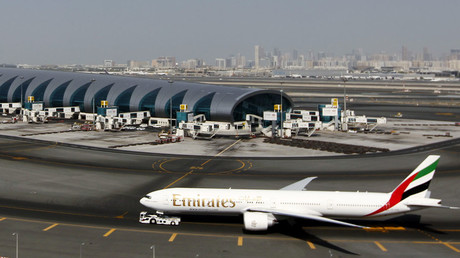
Employees of Emirates Airline refer to the company as a “golden cage,” which allegedly exhausts crews beyond their limits and employs punishments when complaints are filed, the administrator of a dedicated whistleblower site has told RT.
Speaking on condition of anonymity, the administrator of donotflyemirates.wordpress.com, which collects the accounts of Emirates Airline pilots and publishes their stories online, stressed that the company creates “a culture of fear,” where workers feel unprotected, targeted and trapped.
The site administrator noted that the United Arab Emirates (UAE) does not allow unions, which leaves staff even more vulnerable to abuse.
“If you make a mistake – or even if you don’t make a mistake, if someone blames you for something – you don’t get the chance to defend yourself. You just get the warning, they just fire you.”
“After some time spent in Dubai you feel like everything you have, your whole life is in danger. Because if you get fired, you’re going to lose your house, you’re going to lose your whole life. This is why they are referring to it as a ‘golden cage.’”
The whistleblower site is already banned in the UAE, but the airline wanted to silence it further, as Emirates Airline lawyers reached out to Wordpress and urged the blogging platform to take down the whistleblower site, which it refused to do.
“I received a notification from Wordpress platform, they notified me that Emirates lawyers tried to take down some content from my blog, and Wordpress refused them.”
The administrator, who is a former employee of Emirates Airline, told RT that all the pilots’ stories are received via email. They are all verified before they are published.
The site coordinator also received warning letters while still employed by the airline for having a “negative influence on others” when discussing shifts and workloads.
Earlier, RT spoke to current as well as former Emirates pilots, who confirmed that the company forces them to take heavy workloads and implements “bullying” techniques.
An ex-Emirates employee described the company’s rosters as “brutal,” as the pilots are “expected to switch from day to night… duties without enough rest in between,” adding that he “loses several nights of sleep every month,” is “constantly tired,” and has “no energy to do anything.”
Making matters worse is the fact that the UAE’s General Civil Aviation Authority (GCAA), charged with regulating aviation safety, has failed to act. Speaking to RT on condition of anonymity, a former Emirates pilot said that the Dubai-based aviation watchdog is not independent from the state, and thus cannot adequately fulfill its duties.
The problem is further exacerbated as the GCAA is controlled by the same people in charge of the airline. Another pilot employed by Emirates revealed that the GCAA is chaired by the CEO of Emirates Airline & Group – Sheikh Ahmed Bin Saeed Al Maktoum.
The airline itself has refused to acknowledge the problem of pilot fatigue when contacted by RT.
The latest response from an Emirates spokesperson claimed that the company meets the required standards.
“Emirates operates in a safe, highly regulated environment and our safety record, which ranks among the top in the industry, demonstrates our rigorous standards. Our crew rosters are built based on GCAA rules, which are in line with recognized international organization standards. Emirates has a Pilot Fatigue Risk Management system that continuously examines flight crew roster patterns and reviews any feedback received from our pilots. Therefore, we cannot substantiate any of the anonymous allegations that have been reported by Russia Today.”
“Emirates actively encourages staff to report on all aspects of safety so that proper analysis and investigations can be conducted. All staff are provided with a direct, easy link with management to report and provide feedback, regardless of its nature.”
However, the Emirates pilot that most recently spoke with RT disagrees, arguing that even though the airline has a Pilot Fatigue Risk Management system, it rarely does anything to address the problem. Instead, it pursues tactics of pilot intimidation to discourage further complaints.
“We file ASRs [Aviation Safety Reports], we highlight problems, and [for that] we can get called by the management, brought into the office… They highlighted a problem, they [could have] made a mistake, whether due to tiredness or just an error...and for that they simply give you a warning letter, this is happening all the time. And what happens is, people are becoming afraid to write ASRs to highlight issues, and it gets hidden,” the pilot said.
The problem is that while exhausting rosters are not illegal, they are “immoral” and “not consistent with sleep patterns,” added the pilot. “When you are flying more than 100 hours a month these issues are cumulative, and they build up. You just start to feel worse and worse and worse… But the airline will tell you ‘our rosters are legal.’ Yes, they are legal rosters. They do have some illegal rostering practices – but they won’t admit to that.”
When describing his personal experience of fatigue during flights, the pilot said that he and his co-pilot had both fallen asleep when approaching the ground, “the time when you need to be most alert.”
Aside from the issue of pilot fatigue, Emirates Airline tries to appear more professional by reusing old employee numbers on new staff, thus making it seem that they have a well-experienced team in charge of the flights, one cabin crew member told RT.
However, the reality is that “the majority of new staff are resigning within six months. Newcomers cannot cope with the workload and fatigue.”
(culled from www.rt.com)
No comments:
Post a Comment